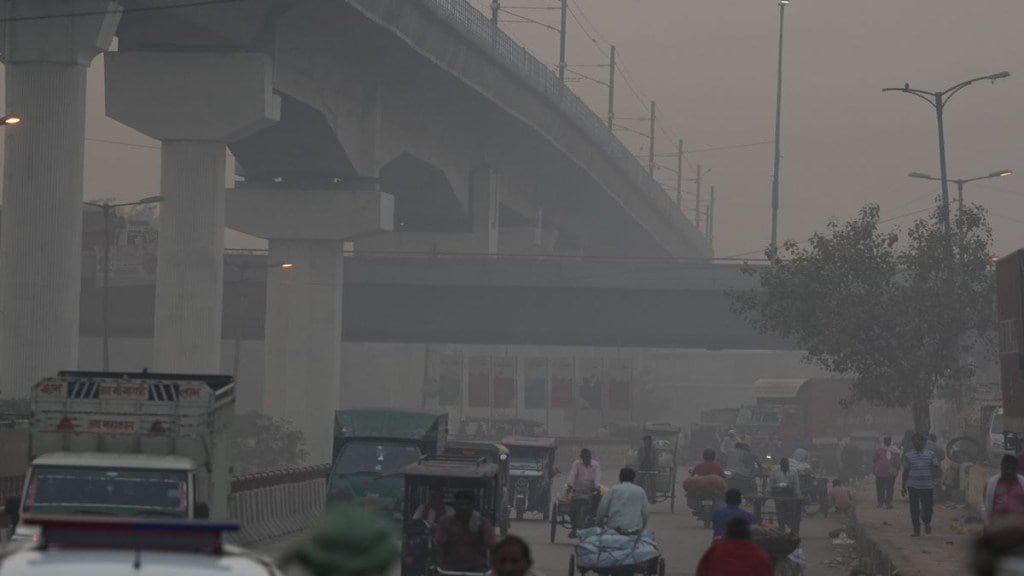Delhi Air Pollution: Amid political blame game and court orders, the National Capital’s air quality continues to worsen. On Tuesday, Delhi’s overall air quality slightly improved as the Air Quality Index (AQI) level reached ‘very poor’ category after being in the ‘severe’ category for five consecutive days.
The AQI in the national capital stood at 394 (very poor), a minor improvement from the 421 recorded the previous day at 4 PM.
Moreover, the Supreme Court slammed the central and state governments for blaming each other for the Delhi air pollution issue. To minimise the impact, the authorities have suspended physical classes, except for Classes 10 and 12, until November 10 and the odd-even car rationing system will return from November 13 till 20.
Although Delhi witnessed a marginal dip in pollution levels with respect to AQI, the concentration of PM2.5 exceeded the government-prescribed safe limit of 60 micrograms per cubic metre by seven to eight times in the capital. According to media reports, it was 30 to 40 times the healthy limit of 15 micrograms per cubic metre set by the World Health Organization (WHO).
‘Grave threat to children, expecting mothers’
Dr Amit Gupta, Senior Consultant Paediatrician & Neonatologist, Motherhood Hospital, highlighted that the toxic air pollution in Delhi NCR poses a grave threat to children, expecting mothers and increasingly concerning risks for their developing unborn children.
“Surprisingly, these past 5/7 days, we have witnessed a concerning trend due to the pollution and smog in Delhi NCR, which is just the beginning of the season. We are observing a significant increase in pediatric cases, with children suffering from cough, cold, allergies, wheezing, and asthma. The situation is slowly becoming alarming. The winter has just begun and I am noticing a sudden increase in children below the age of 5 years old having symptoms like wheezing, breathlessness, and persistent coughs. These weren’t responding to the typical treatments they get for these issues,” Dr. Gupta said.
Regular decongestants are less effective in these cases and the pollution is destroying their health, he warned.
“They’re, missing school frequently due to regular cough and cold. Missing school can lead them to be delayed in development. It’s now well-established that kids experiencing high levels of air pollution like our NCR area are more likely to develop serious health problems in some cases even associated with cancer. Children are especially vulnerable to air pollution when compared to adults. Their short height and faster breathing make it easier for them to breathe in particles floating around. In addition, their defense mechanisms aren’t as strong as ours so things like the cilia in their nose are unable to fully protect them from harmful stuff in the air especially when their nose is blocked and they are breathing from their mouth,” he pointed out.
In the case of the developing fetus, studies have shown that air pollution can disrupt normal development, impacting lung and brain development, which may result in long-term health problems for the child, he said.
“Furthermore, prenatal exposure to air pollution has been linked to an increased risk of childhood respiratory conditions, cognitive impairments, low birth weight, premature delivery and behavioral issues. Research has revealed that the toxic air pollutants in this region, such as fine particulate matter (PM2.5), volatile organic compounds (VOCs), and heavy metals, can penetrate the placental barrier and directly affect both the mother and the unborn child,” he added.
‘Increased risks of diseases and premature mortality’
Dr. Vivek Nangia, Principal Director & Head, Pulmonology, Max Super Speciality Hospital, Saket revealed that air pollution has now emerged as the foremost global environmental health threat, resulting in increased risks of diseases and premature mortality.
“During this particular period of the year, there has been a notable surge in the number of individuals seeking medical attention, with a significant rise in both outpatient department (OPD) visits and emergency room admissions. Various studies have consistently shown a clear correlation between high levels of air pollution, as indicated by Air Quality Index (AQI) readings, and the increased incidence of acute symptoms in patients, including those with pre-existing conditions such as asthma, chronic obstructive pulmonary disease (COPD), and in some cases, even cardiovascular issues like heart disease and heart attacks,” Dr. Nangia told Financial Express.com.
The most vulnerable population groups affected by this air quality deterioration are the very young (below five years of age) and the elderly (aged 60 and above), he said.
What are the health risks of air pollution?
According to Dr Kuldeep Kumar Grover, Head of Critical Care and Pulmonology, CK Birla Hospital, Gurugram, the health risks posed by air pollution vary based on the type and concentration of pollutants, as well as an individual’s health status. The health risks include:
- Acute severe bronchitis or flare-up of bronchial asthma. Long-term exposure to some pollutants increases the risk of emphysema more than smoking a pack of cigarettes a day.
- One may experience repeated viral episodes of rhinosinusitis and chest infection
- Acute myocardial infarction (MI) or neurological stroke in susceptible comorbid patients of long-standing Diabetes Mellitus, coronary artery disease, and old stroke patients
- Frequent or recurring headaches along with mood disorders
- Excessive air pollution can also lead to an increased risk of cancer
- Ozone is formed in the atmosphere through reactions of volatile organic compounds and nitrogen oxides, both of which are formed as a result of the combustion of fossil fuels. Short-term exposure to ozone can cause chest pain, coughing and throat irritation, while long-term exposure can lead to decreased lung function and cause chronic obstructive pulmonary disease.
How to protect yourself?
According to Dr. Gupta, we can make a difference in our children’s immunity by being role models as responsible parents and community members. Encouraging them to eat well, exercise, and practice good hygiene is a great move, he said.
- It is advisable to avoid walking on busy roads and around areas that have high smoke emissions like industrial areas, as the pollutants in the air around these areas are extremely harmful.
- If you are traveling by car, it is best to keep the windows closed, especially during traffic jams to avoid the pollutants from contaminating the air in your car.
- You can also replace cabin air filters with HEPA filters in your car to improve the air quality inside your car.
“We may not be able to eliminate pollution altogether, but we can still take small actions that can create huge impacts. A few steps include sending our kids to school with N95 masks, using quality room filters for better indoor air quality, practicing hand hygiene, and limiting the time they spend outside when the air quality is bad,” he said.
According to Dr. Nangia, as for preventive measures, it’s essential to recognize that addressing air quality issues requires collective national efforts and policies. However, individuals can play a role in safeguarding their health by making informed decisions about outdoor activities based on AQI levels, he added.
- For instance, if the AQI level exceeds 200, individuals at higher risk, especially the vulnerable groups, should refrain from engaging in strenuous physical activities outdoors.
- When the AQI exceeds 300, it’s advisable for everyone to avoid such activities outside.
- Those falling into the most at-risk category should consider staying indoors altogether.
- When venturing outside, the use of N95 masks is a valuable protective measure, as they offer effective filtration against PM 2.5 particles, capturing up to 95% of them.







